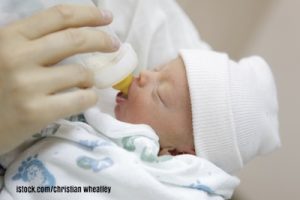Last week, the CDC issued a new report informing consumers about the possible presence of Cronobacter, formerly called Enterobacter sakazaki, a pathogen found in the environment that can survive under very dry conditions. Bacteria usually need a certain amount of free water in food products to survive.
 This bacteria has been found in the past in powdered infant formula, powdered milk, herbal teas, and starches, which are foods not usually associated with bacterial contamination. The government is especially concerned about infants, who are more susceptible to serious complications from bacterial infections.
This bacteria has been found in the past in powdered infant formula, powdered milk, herbal teas, and starches, which are foods not usually associated with bacterial contamination. The government is especially concerned about infants, who are more susceptible to serious complications from bacterial infections.
In fact, Cronobacter infections are often deadly in young infants. Three are only about 4 to 6 cases from Cronobacter every year in infants, but reporting this illness isn’t required, unlike infections caused by Salmonella, E. coli, and Listeria. Cronobacter outbreaks in infants have been reported in many countries around the world, according to research published in the Journal of Food Protection.
Cronobacter causes sepsis, which is a blood infection, and meningitis, which is an inflammation of the membranes around the spine and brain. This illness usually starts with a fever, and symptoms are crying, very low energy, and poor feeding. Any infant exhibiting these symptoms should be taken to a doctor immediately.
The recommendations to prevent this infection include breastfeeding your baby. If that is not possible, always wash your hands carefully before preparing formula, and use soap and water, especially after using the bathroom and changing diapers. Cronobacter has been found in sewer water and other places. The bacteria lives in the environment, so in past outbreak investigations, it may have contaminated the powdered infant formula in the factory or after it was opened at home.
Infant formula manufacturers say that it is not possible to get rid of all bacteria from powdered infant formula in the factory with current methods. Therefore, very young infants, infants born prematurely, and infants who have problems with their immune systems should be fed infant formula sold in liquid form. Those formulations are made to be sterile.
If you do choose to use powdered infant formula, always use good hygiene. Wash your hands well before handling the formula. Clean bottles in a dishwasher with hot water, or scrub bottles in hot, soap water and sterilize them. Keep powdered formula lids and scoops clean, and close the containers as soon as possible.
Mix the formula with water hot enough to kill bacteria. The water should be at least 158°F (70°C) and above, to make the formula. Shake the formula in the bottle rather than stirring it, since the spoon could introduce bacteria into the mixture. Then cool the formula by running the capped bottle under cool water or putting it into an ice bath. Always test the temperature by shaking a few drops on your wrist.
Use formula within two hours of preparation. If it is not finished in one feeding, throw away any uneaten formula. Formula that has not been fed can be refrigerated and used within two hours. When in doubt, throw it out.
And always wash your hands before touching your infant’s mouth, and before touching pacifiers and other objects that a baby will put into his mouth. Alcohol based sanitizers can be used in a pinch, but they are not a substitute for washing with warm water and soap.




